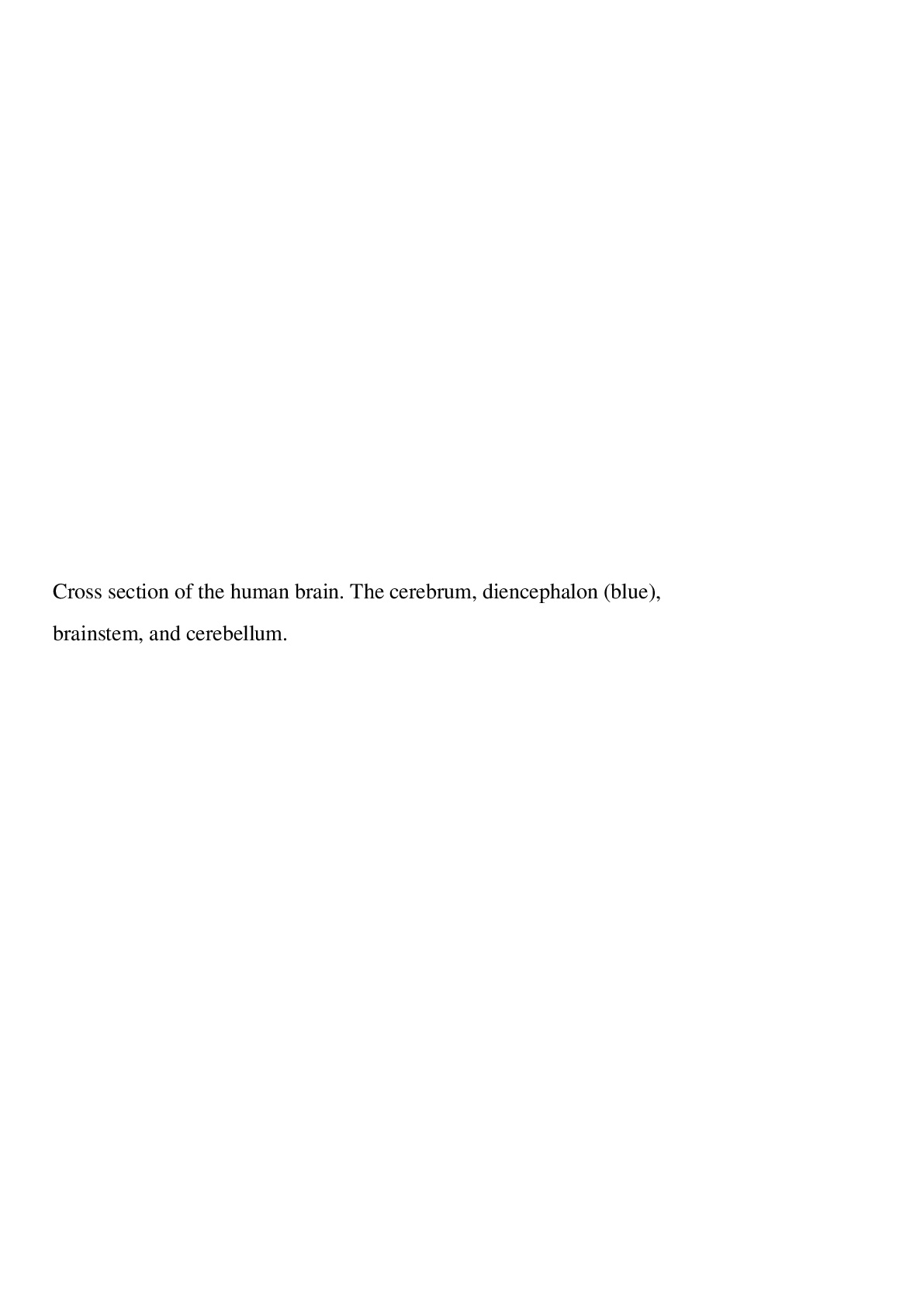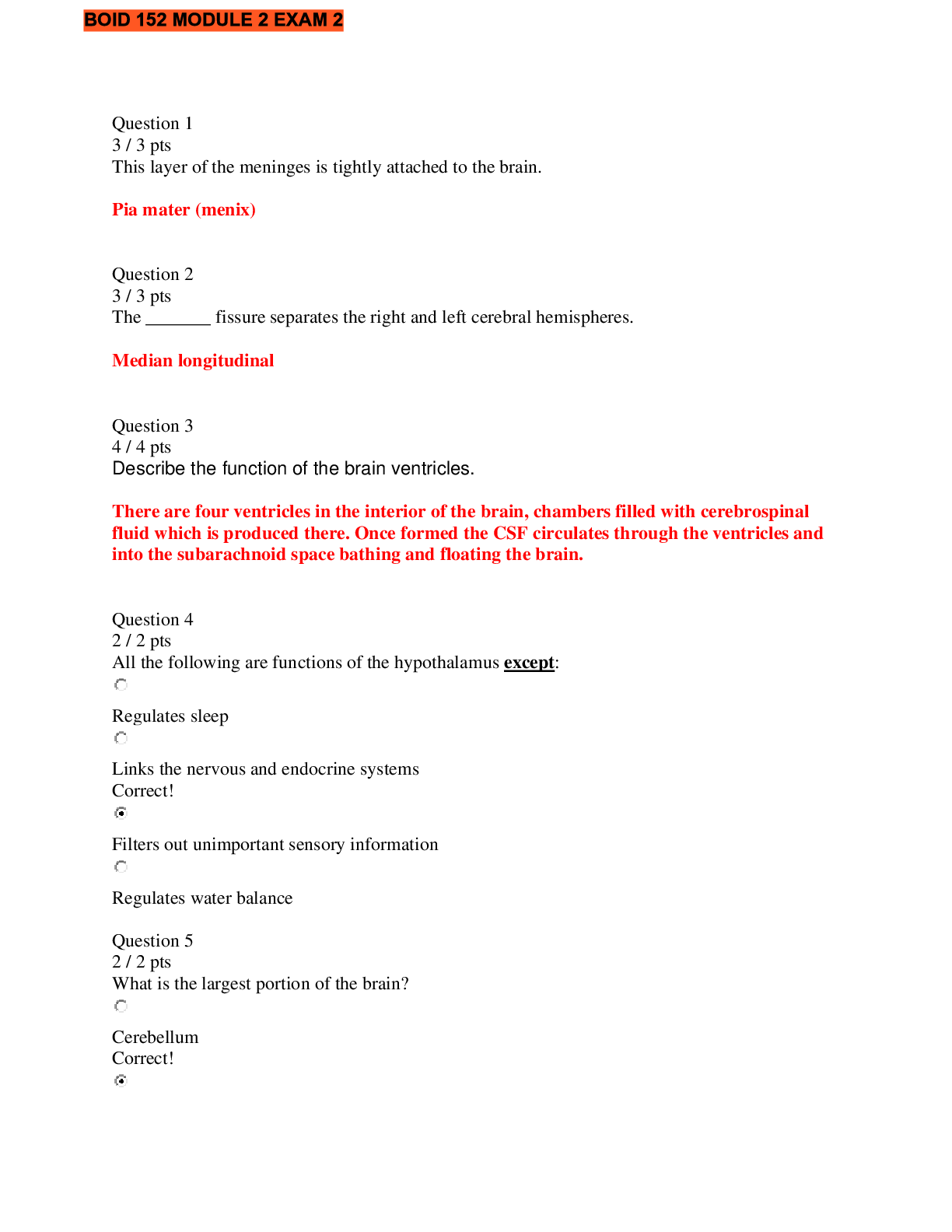Law > QUESTIONS & ANSWERS > Employment Law - C233 – WGU, EXAM questions with accurate answers, rated A+ (All)
Employment Law - C233 – WGU, EXAM questions with accurate answers, rated A+
Document Content and Description Below
Employment Law - C233 – WGU, EXAM questions with accurate answers, rated A+ Voluntary Affirmative Action Plan - ✔✔-A plan put into place by an employer whose self-analysis reveals effects... of past discriminatory action. Whistleblower - ✔✔-Individual who reports real or perceived wrongs committed by the employer. Whistleblowing - ✔✔-The action of an employee to report the wrongdoings of an employer. Wildcat Strike - ✔✔-A strike by a portion of workers that is not authorized by the union. Worker Adjustment and Retraining Notification Act (WARN) (Time before Mass Layoff) - ✔✔-Enacted in 1988, it gives terminated workers an opportunity to search for other employment or obtain additional training. WARN requires employers with over 100 employees to provide detailed written advance notification of plant closings and mass layoffs to affected employees Worker's Compensation - ✔✔-A form of insurance that provides wage replacement and medical benefits for employees injured while at work in exchange for relinquishment of the right to sue the employer for negligence. Workforce Analysis - ✔✔-A review of jobs, ranked by title and compensation. Workweek - ✔✔-Any consecutive seven-day period. Yellow Dog Contract - ✔✔-A document whereby an employee agrees not to organize or join a union. 20-factor Analysis - ✔✔-A guide adopted by the Internal Revenue Service for determining if a worker should be classified as an independent contractor. ADA Amendments Act - ✔✔-Passed in 2008, it amends the ADA by adding new protections for employees with disabilities. ADEA - ✔✔-Age Discrimination in Employment Act ADEA Waivers - ✔✔-A statement from a retiring employee that he or she will not make a personal ADEA claim against the employer in exchange for retirement incentives. Abuse of Discretion - ✔✔-An employer's failure to consider important and relevant facts; acting in an arbitrary or capricious manner. Adverse Job Action - ✔✔-A negative job action that results from an employee's lawful actions. Affirmative Action (AA) - ✔✔-Any action taken by an employer to overcome discriminatory effects of past or current practices that create barriers to equal employment opportunity. Affirmative Action Plan - ✔✔-"Plan that analyzes a workforce to determine whether protected classes are underutilized in different job groups and describes how an organization will address any underutilization that exists." Age Discrimination - ✔✔-Treating an applicant or employee less favorably because of his or her age. Age Discrimination in Employment Act (ADEA) - ✔✔-Enacted in 1967, it protects employees who are 40 years of age and older. Agency - ✔✔-A contract relationship between a principal and an agent whereby the principal authorizes the agent to work on his or her behalf and with power to bind the principal. Americans with Disabilities Act (ADA) - ✔✔-Employers with 15 or more employees are prohibited from discriminating against people with disabilities. In general, the employment provisions of the ADA require equal opportunity in selecting, testing, and hiring qualified applicants with disabilities; job accommodation for applicants and workers with disabilities when such accommodations would not impose "undue hardship;" and equal opportunity in promotion and benefits. Tangible Job Action - ✔✔-An employment outcome arising out of sexual harassment. Title VII of the Civil Rights Act of 1964 - ✔✔-Protects all races from discrimination. Tort - ✔✔-A civil wrong which causes someone harm. U.S Constitution - ✔✔-Established America's national government and fundamental laws, and guaranteed certain basic rights for its citizens. USERRA - ✔✔-Uniformed Services Employment and Reemployment Rights Act Underutilization - ✔✔-A discrepancy between the number of women and minorities in a particular position and the number of qualified women and minorities in the constituent market. Undue Hardship - ✔✔-An accommodation to the work environment that places a significant burden or expense on the employer. Unfair Labor Practice (ULP) - ✔✔-Action by an employer or a union that restrains or coerces employees from exercising their rights to organize and bargain collectively or to refrain from doing so. Unfair Labor Practices Strike - ✔✔-A stoppage of work in order to pressure management to follow the law. Uniformed Services Employment and Reemployment Rights Act (USERRA) - ✔✔-Enacted in 1994, it prevents any employer from discriminating against someone who is or has been in military service. Union Shops - ✔✔-A bargaining clause that allows a condition that all employees must join the union once hired. Unions - ✔✔-An organization that represents workers in bargaining with employers. Unwelcome Conduct - ✔✔-Conduct that is not solicited by an employee and that a reasonable person would regard as offensive. Vesting - ✔✔-The conveying of an employee's rights to benefits or contributions after a certain amount of time. Vicarious Liability - ✔✔-A form of secondary liability that comes from the doctrine of respondeat superior - "let the master answer for the servant". Vietnam Era Veteran Readjustment Assistance Act - ✔✔-Passed in 1974, it requires contractors to take affirmative action toward veterans. Sexual Harassment - ✔✔-Harassment directed at an employee because of his or her gender. Sherman Anti-Trust Act - ✔✔-Enacted in 1890, it prevents businesses from combining together to restrain trade and seeking monopoly business power. Stare Decisis - ✔✔-(Latin for "let the decision stand") the doctrine of a court following the precedent of an earlier court Statute of Frauds - ✔✔-A doctrine that requires certain contracts to be in writing. Steering Assignments - ✔✔-A type of race discrimination in which an employer hires a minority and assigns him or her to a less-desirable position. Strike - ✔✔-A work stoppage by mass refusal of employees to work. Summary Plan Document (SPD) - ✔✔-A document issued from an employer to an employee that contains information about an employee's benefits. Supervisor - ✔✔-A managing employee who has power to take tangible employment actions against an employee. Supremacy Clause - ✔✔-Article VI, Paragraph 2 of the Constitution is commonly referred to as the Supremacy Clause. It establishes that the federal constitution, and federal law generally, take precedence over state laws, and even state constitutions. Public-policy Exception - ✔✔-A rule of exception to the employment at-will doctrine that states that an employer cannot terminate an employee for reasons that violate public policy. Punitive Damages - ✔✔-Monetary damages designed to punish an employer who acted maliciously or recklessly. Qualifying Event - ✔✔-An event that entitles an employee to twelve weeks unpaid leave. Quid Pro Quo - ✔✔-(Latin for "this for that") The notion that an employer seeks sexual favors in exchange for some positive employment outcome for an employee. Quota - ✔✔-An official limit on the number or amount of people or things that are allowed. Race - ✔✔-A local geographic or global human population distinguished as a distinct group by genetically-transmitted physical characteristics. Racial Animus - ✔✔-A type of race discrimination in which an employer obviously excludes an applicant from a job opportunity on the basis of race. Reasonable Accommodation - ✔✔-A reasonable change to the work environment that allows an individual with a disability to perform job functions. Reasonable Action - ✔✔-Sensible action taken to remedy an injustice or imbalance. Reasonable Factor Other Than Age (RFOA) - ✔✔-An employer defense to a disparate impact claim that age was not a factor in an employment action. Reasonable Person Test - ✔✔-Hypothetical person in society who exercises average care, skill, and judgment in conduct and who serves as a comparative standard for determining liability. Reasonable Rationale - ✔✔-A sensible justification for an affirmative action. Reasonable Self-analysis - ✔✔-A review of what a contractor's workforce looks like. Rebuttal - ✔✔-The action of contradicting or opposing by formal legal argument, plea, or countervailing proof. In this step the plaintiff responds to the employer during an EEOC discrimination claim hearing. Reduction in Force (RIF) - ✔✔-Occurs when a business eliminates one or more positions as part of a strategic business plan to realign operations or reduce cost. Rehabilitation Act of 1973 - ✔✔-This federal law prohibits discrimination on the basis of disability. The Act also authorizes state grants for rehabilitation services to disabled persons. Reinstatement - ✔✔-A remedy in which a former employee returns to his or her job. Remedies - ✔✔-A desired action resulting from a successful lawsuit. Retaliation Claim - ✔✔-A complaint filed by an employee who feels he or she was discriminated against in violation of the law. Retaliatory Discharge - ✔✔-Termination of an employee as punishment for engaging in a protected activity. Reverse Discrimination - ✔✔-Discrimination that occurs when an employer, acting under an affirmative action plan, favors one race or gender in an employment decision. Right-to-work Laws - ✔✔-Laws that give employees the option to not join a union. Same Actor Defense - ✔✔-A defense used by the same employer who hires and then fires an over-39 employee to show that age was not a motivating factor in termination. Scope of Employment - ✔✔-Employee conduct that is reasonably relative to a job description. Secondary Boycotts - ✔✔-A group's refusal to deal with a business that is not directly involved in the dispute. Serious Health Condition - ✔✔-An incapacitating illness, injury, or impairment that requires overnight care or continuing treatment from a health care provider. Permissive Bargaining Subject - ✔✔-A bargaining subject that either party may bring to the table, but over which the other party is not required to bargain. Placement Goal - ✔✔-A reasonably attainable objective to achieve equal employment opportunity. Plant Closing - ✔✔-A single site of employment that is permanently or temporarily shut down for 6 months, or with a 50% reduction in hours over a 6-month period, and impacts 50 or more full-time employees for a 30-day period. Polygraph Testing - ✔✔-A method of testing for an employer to measure an employee's heart, respiratory, and skin reactions while he or she is asked a serious of questions in order to determine if he or she is lying. Pre-adverse Action - ✔✔-A statement issued to an applicant from an employer that discloses negative information found and information about his or her rights. Precedent - ✔✔-A controlling rule, example, or guide established by a judge that provides a framework for other judges to follow in later cases Pregnancy Discrimination Act (PDA) - ✔✔-This Act recognizes pregnancy as a temporary disability and prohibits applicants from being discriminated against in the recruitment process because of pregnancy, childbirth, or related medical conditions (Amendment to Title VII). Pretext - ✔✔-A false excuse used by an employer to cover up for discrimination. Prima Facie - ✔✔-(Latin for "at first sight") Evidence based on the first impression. Privacy - ✔✔-The right of an individual to be left alone. Privacy Act - ✔✔-Enacted in 1973, it governs the release of private information about public employees to federal agencies. Progressive Discipline - ✔✔-Performance management tool designed to modify employee behavior by using a set of increasingly severe discipline steps, with consequences, that hold the employee responsible. Public Disclosure of Private Facts - ✔✔-A type of tort in which an employer negligently or intentionally discloses an employee's private information. Injunctive Relief - ✔✔-A court order that prohibits a defendant from certain actions. Integrated Enterprise - ✔✔-A business environment in which operations of two or more employers are so intertwined that they can be considered as a single employer for purposes of federal statutory coverage and liability. Intelligence Tests - ✔✔-Standardized assessments designed to assess human ability to learn or understand or to deal with new or trying situations. Intentional Infliction of Emotional Distress - ✔✔-An employee's claim that an employer terminated an employee in an intentionally reckless or outrageous manner that caused serious emotional and psychological damage. Intentional Interference with a Contract - ✔✔-An employee's claim that a third party pressures the employer to terminate an employee without cause. Intermittent Leave - ✔✔-A type of leave in which an employee is intermittently absent from work. Intrusion Upon Seclusion - ✔✔-A type of tort in which an employer intrudes upon an employee's private information. Job Group Analysis - ✔✔-A tool that groups jobs within an organization by responsibilities and potential and then analyzes characteristics of each employee in the job group. Joint Employer - ✔✔-Two entities, not engaged in an integrated enterprise, that each exert control over an employee. Joint Ownership - ✔✔-Right of ownership shared by two or more owners such that on the death of an owner his or her right passes on to surviving owner(s), the last survivor becoming the full owner. Judicial Affirmative Action - ✔✔-A court-ordered affirmative action plan. Judicial Review - ✔✔-The power of the Supreme Court to consider whether a law complies with the Constitution. Labor Management Relations Act of 1947 - ✔✔-Enacted in 1947, it curbs union overreaching by protecting employee rights and prohibiting wildcat strikes. Labor-Management Reporting and Disclosure Act of 1959 (LMRDA) - ✔✔-Enacted in 1959, it creates a union member "bill of rights" in order to empower union members and reduce union corruption. Law - ✔✔-A binding set of rules for human behavior established by legitimate authority. Lock Out - ✔✔-An employer's temporary work stoppage initiated during a labor dispute. Major Life Activity - ✔✔-A daily activity that an average person can perform with little or no difficulty. Mandatory Bargaining Subject - ✔✔-A required bargaining subject that involves wages, benefits, hours, and layoff procedures. Mass Layoff - ✔✔-A workforce reduction at a single employment site during a 30-day period which is not caused by a plant closing. Mediation - ✔✔-A procedure for resolving collective bargaining impasses by a mediator (third party with no formal authority) who acts as a facilitator and go-between in the negotiations. Medical Testing - ✔✔-A method of testing for an employer to discover information about its employee's impairments or health. NLRA - ✔✔-National Labor Relations Act National Labor Relations Act (NLRA) - ✔✔-Enacted in 1935, it establishes workers' rights to form unions, collectively bargain, and strike. National Labor Relations Board - ✔✔-A federal administrative agency that administers the provisions of the NLRA. National Origin - ✔✔-Location of birth. National Origin Discrimination Harassment - ✔✔-Harassment that includes offensive comments about an employee's national origin. Negligent Hiring - ✔✔-A claim in which the employer knew or should have known about an employee's history of violence or untrustworthiness. Negligent Referral - ✔✔-A claim in which an employer has provided an untrue reference that omits information about an employee's dangerous and/or criminal behavior. Negligent Retention - ✔✔-A claim that arises when an employer fails to terminate an employee when it is apparent that he or she poses a danger to others. Norris-LaGuardia Act aka Federal Anti-Injunctive Act - ✔✔-Enacted in 1932, it governs the interplay between unions and businesses. Occupational Safety and Health Act (OSHA) - ✔✔-Enacted in 1970, it governs safety in all businesses and created the Department of Labor and the Occupational Safety and Health Administration. Official Bargaining Unit - ✔✔-A group of workers represented by a union in collective bargaining. Older Workers Benefit Protection Act (OWBPA) - ✔✔-Enacted in 1990, it allows employers to offer retirement incentives to older workers. Omnibus Transportation Employee Testing Act (Omnibus Act) - ✔✔-Enacted in 1991, it authorizes and regulates the drug testing of employees in the airline, railroad, trucking, and public transportation sectors. Opportunity Wage - ✔✔-An exception to the minimum wage law that applies to employees under twenty years old. Organizational Display - ✔✔-An organizational chart that includes demographics data for all positions. Pattern and Practice - ✔✔-When an employer's policies have the effect of discrimination for no legitimate business necessity. Anti-female Animus - ✔✔-An environment of animosity toward women. Appropriation of Image or Likeness - ✔✔-A type of tort in which an employer uses the name, image, or likeness of an employee for commercial purposes in a way that is not described in the job description. Arbitration - ✔✔-A procedure for resolving collective bargaining impasses by which an arbitrator (third party) choose a solution to the dispute. Assumption of the Risk - ✔✔-An employer defense that states an employee knows and accepts the risk of potential injury in a certain position. BFOQ - ✔✔-(Bona Fide Occupational Qualification) Job requirement that an employee be a particular religion, sex, or national origin that is reasonably necessary to business operations. For instance, it is assumed that an opening for a Baptist minister at a local Baptist church would be filled by a minister who is actually a person who celebrates the Baptist religion and not, say, the Episcopal religion. Back Pay - ✔✔-Monetary compensation for a plaintiff's lost earnings. Business Necessity - ✔✔-A legitimate business purpose that justifies an employment decision as effective and necessary. Case Law - ✔✔-The law as laid down in the decisions of the courts (distinct from statutes or other sources of law). Civil Law - ✔✔-Laws that deal with the rights of people rather than with crimes. Civil Rights Act of 1964 - ✔✔-Enacted in 1964, it prohibits race discrimination in employment. Clayton Act - ✔✔-Enacted in 1914, it prohibits the elimination of unions. Closed Union Shop - ✔✔-An illegal requirement that an employee be a union member. Collective Bargaining - ✔✔-The negotiation process between unions and employers. Color - ✔✔-Skin pigmentation characteristic of race, especially other than white. Common Law - ✔✔-Principles developed over centuries as a result of legal decisions made by judges in individual cases. Common Law Agency - ✔✔-A test that classifies a worker as an employee if the employer maintains the right to control the method of work performed. Common Law Criminal Conspiracy - ✔✔-A combination of two or more individuals planning to accomplish an unlawful purpose. Community of Interests - ✔✔-A community of people who align themselves with a common interest. Comparable Worth Theory - ✔✔-The notion that men and women should receive equal pay when they perform work that requires comparable skills and responsibilities. Comparative Evidence - ✔✔-Evidence of discrimination that is found by comparing two similarly situated employees who were treated differently because of a class characteristic. Compensatory Damages - ✔✔-Monetary compensation necessary to replace a plaintiff's losses. Compensatory Time - ✔✔-An option for public employers to allow time off for employees instead of payment. Complaint - ✔✔-A formal allegation against a party . Compliance Requirement - ✔✔-A mandate that all employers comply with all safety and health requirements issued by the Department of Labor. Concerted Activity - ✔✔-Any effort by employees to join together to seek improvement in working conditions. Conciliation - ✔✔-Process where a third party acts as an intermediary between the parties to a labor dispute, helping them to reach a settlement. Conglomerate - ✔✔-A highly diversified firm that has multiple businesses with no relationships. Consent Decree - ✔✔-An agreement between two parties to resolve a dispute. Consolidated Omnibus Budget Reconciliation Act (COBRA) - ✔✔-Enacted in 1986, it allows an employee to extend company health care benefits for up to eighteen months after he or she leaves a job. Constructive Discharge - ✔✔-Resignation of an employee because an employer allows working conditions that are no longer tolerable for any reasonable employee. Consumer Reporting Agency (CRA) - ✔✔-An entity that collects and provides information about persons for use in credit and/or employment evaluation. Continual Training Requirement - ✔✔-A mandate that all employers provide training to workers on a periodic basis and whenever an employee is h [Show More]
Last updated: 2 years ago
Preview 1 out of 28 pages
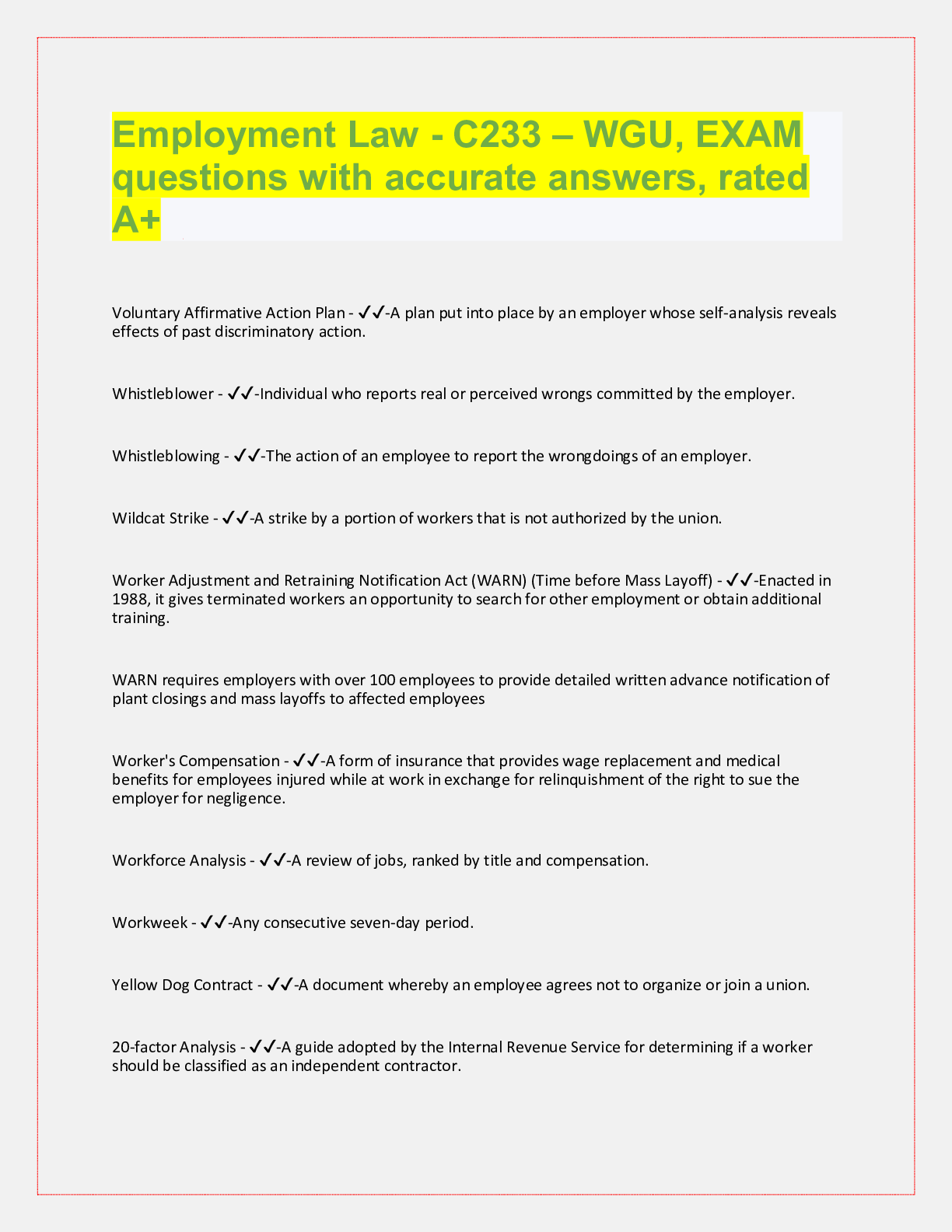
Buy this document to get the full access instantly
Instant Download Access after purchase
Buy NowInstant download
We Accept:

Also available in bundle (1)
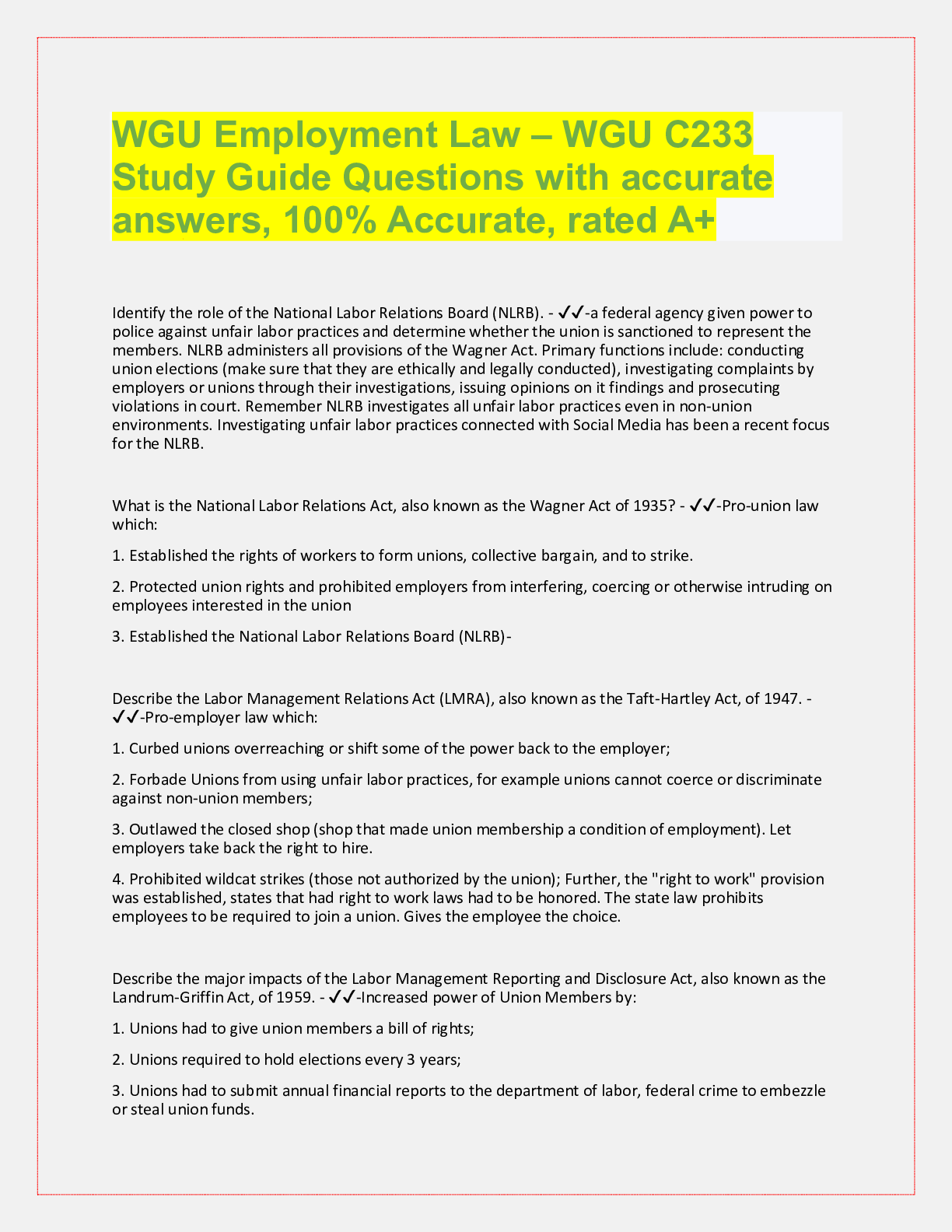
WGU C233 EXAM BUNDLE, VERIFIED
WGU C233 Employment Law, Exam Questions with accurate answers, rated A+. 39 VERSIONS, APPROVED PASS RATE
By Topmark 2 years ago
$35
32
Reviews( 0 )
$10.00
Can't find what you want? Try our AI powered Search
Document information
Connected school, study & course
About the document
Uploaded On
Mar 13, 2023
Number of pages
28
Written in
Additional information
This document has been written for:
Uploaded
Mar 13, 2023
Downloads
0
Views
117

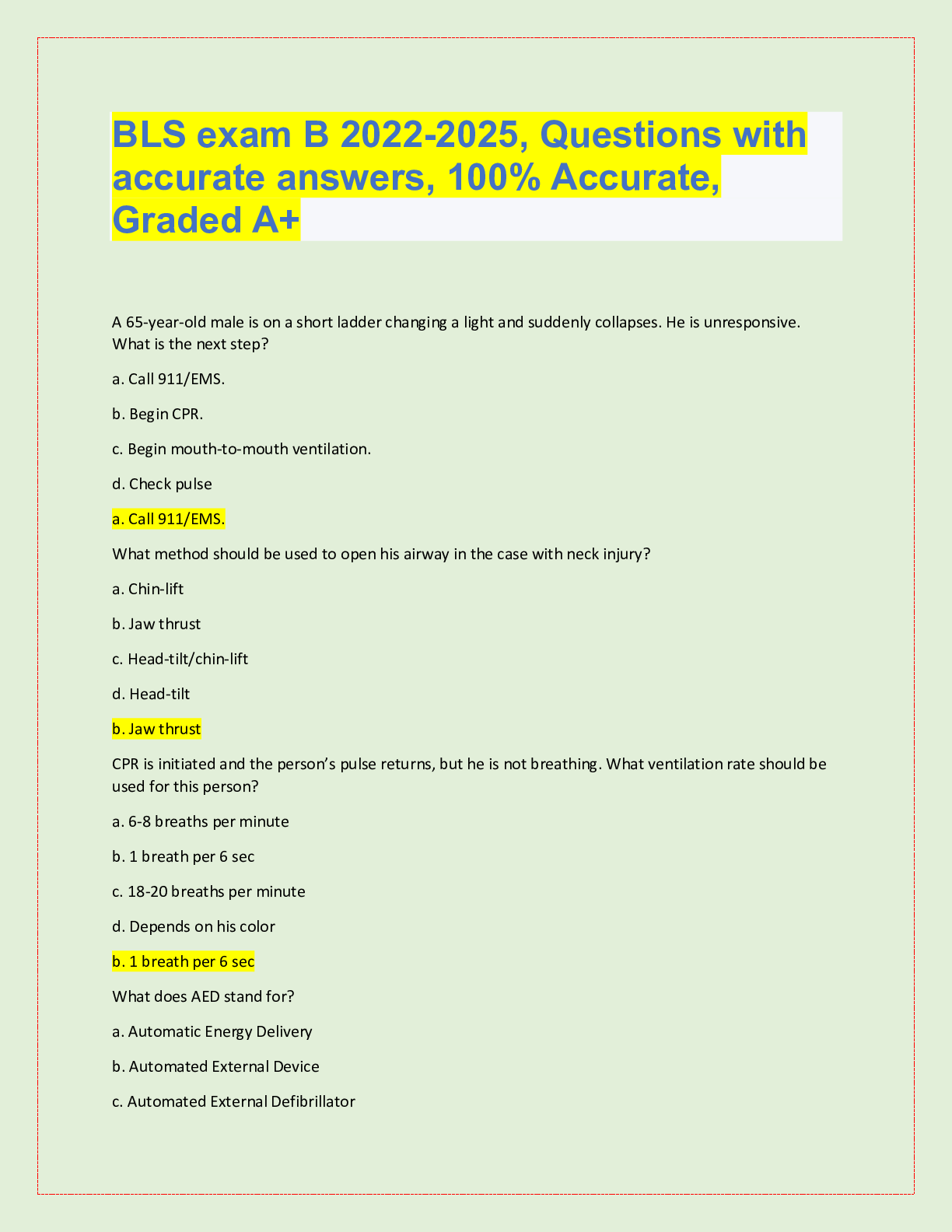











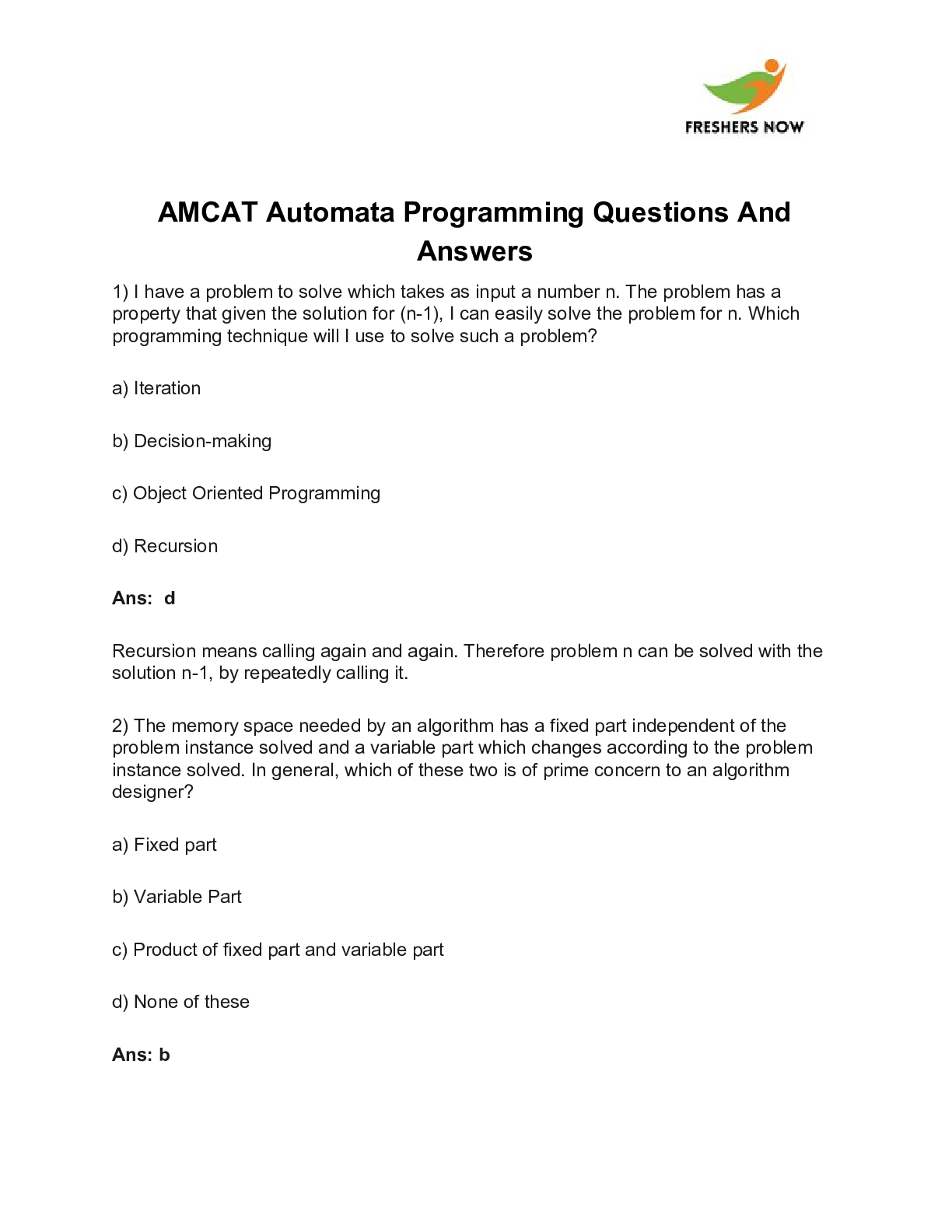

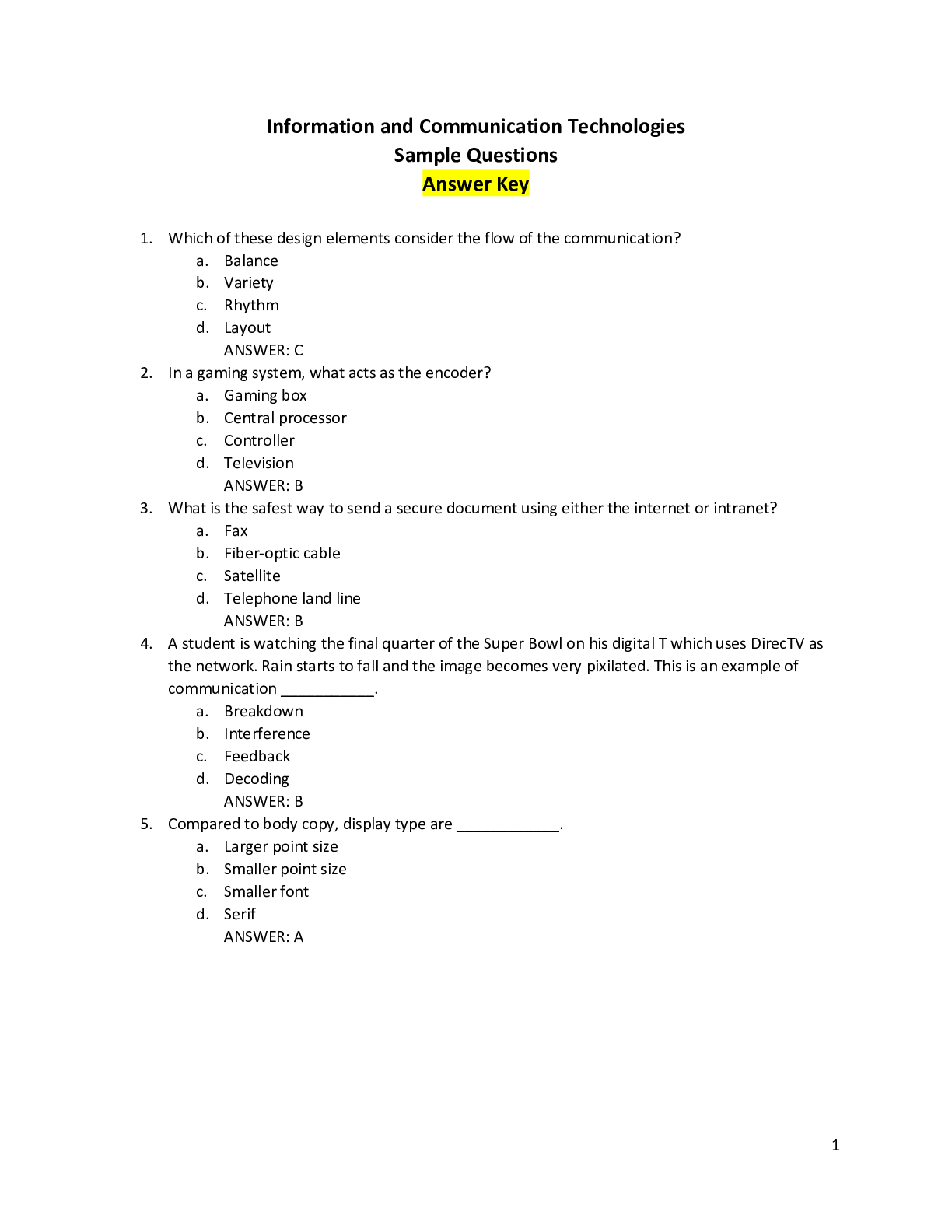

.png)

.png)
